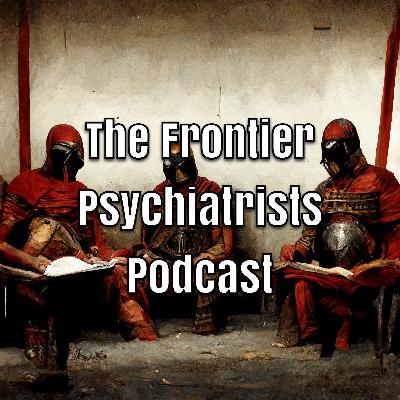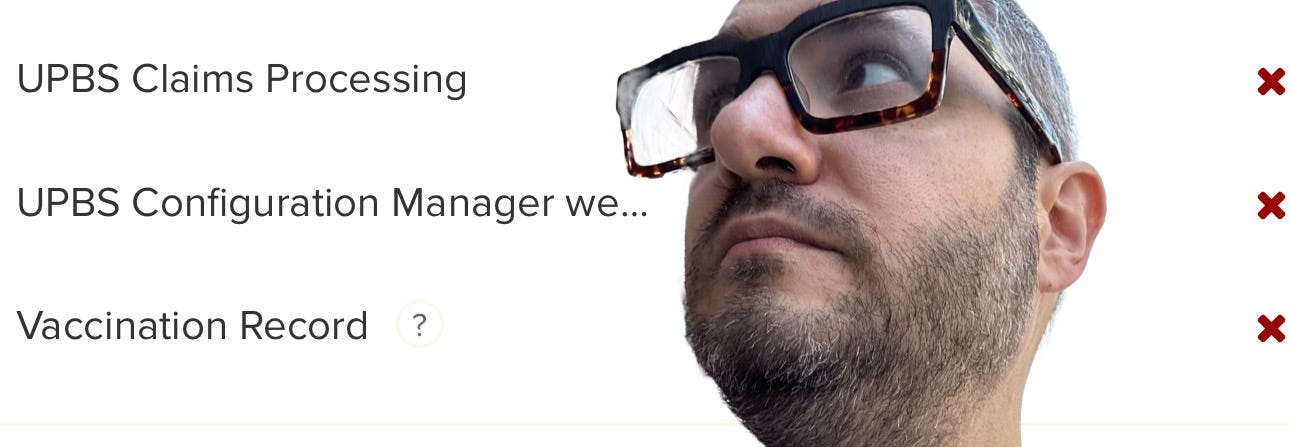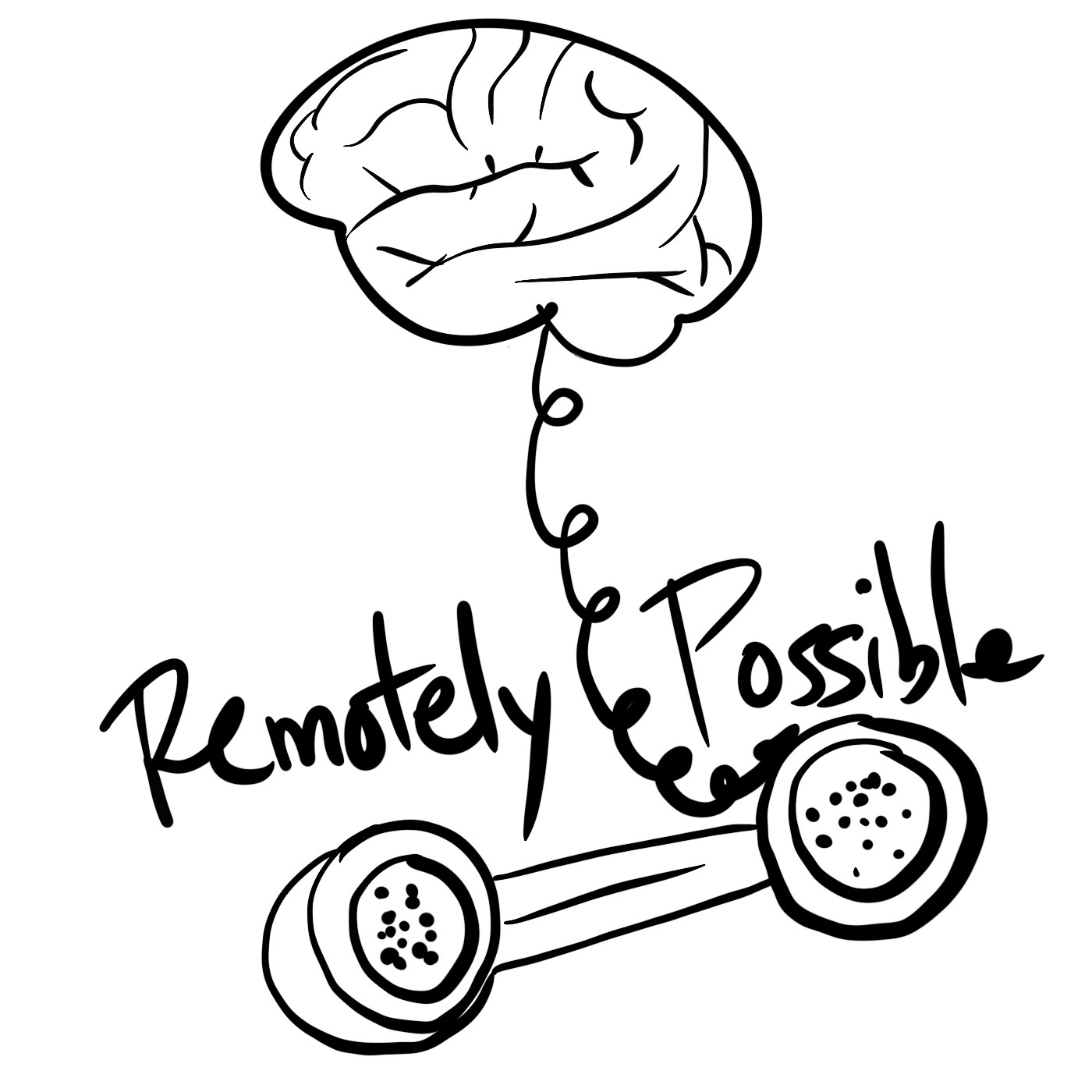Discover The Frontier Psychiatrists
The Frontier Psychiatrists

68 Episodes
Reverse
The Frontier Psychiatrists is a newsletter and a podcast. Most people assume podcast means “recording a good enough conversation.” Yes, I do those too. I also have a sick fetish for spending way too much time crafting highly produced audio pieces that happen to be podcasts. I think these might need a different name in the future—what happens when species diverge in evolution?This story is about someone I know—Alan Emamdee, D.O. A man arrested for a crime he didn’t commit. Unlike the A-Team, he didn’t get to go on the run and help people unionize in an 80s TV show. He’s a doctor who suffered through years of a brutal legal process till he was acquitted at trial. The road back hasn’t been easy, but he had the tape. This is the first episode. It’s worth the listen. Please, share with your friends. This is a public episode. If you’d like to discuss this with other subscribers or get access to bonus episodes, visit thefrontierpsychiatrists.substack.com/subscribe
The Frontier Psychiatrists started as a Creator First show on the ill-fated clubhouse app. One of our favorite guests was the remarkable (Jeremy Fox, LPC), an EMDR therapist with a passion for working with men around their actual problems. One of those is the loss of normative friendships among men—15% of men report no close friendships at all. This corrosion of close relationships is an accelerating problem for both individual men and society.Today’s episode of the podcast includes both the video above and pushes the audio to the podcast feed!Prior writing on the value of friendships and what we can do about that includes articles such as:It’s important to have FriendsFriends: A How-To GuideMatthew Perry was ClassyA Conflict of Interest Disclosure Regarding My Picks for SXSWThe Future of Brain Health?Announcing: May 5th, 2024…Rapid Acting Mental Health Treatment NYC 2024(Eventbrite Link)It’s a night of thrilling conversations about the future of mental health. It features speakers from…Videra, MDHub, Osmind, Neurosigma, iRxReminder, and…Lykos Theraputics!More info to come…but it’s the second IRL The Frontier Psychiatrists event, and we could not be more excited to have you! This is a public episode. If you’d like to discuss this with other subscribers or get access to bonus episodes, visit thefrontierpsychiatrists.substack.com/subscribe
The Frontier Psychiatrists is a daily health-themed publication. Your author’s love of podcasting is well established, and today, another from the vaults, dating back to the pandemic. In this episode, which I called “The Wave,” I started getting a little more ambitious in production, and strange in the jagged nature of my storytelling. I interview John Samuels, of WellWorth Advisors, Sonia Patel, of Capsule, and a journalist from the New York Times, as well as folks on my team at the time. Thanks for stepping in the way back machine with me. The pandemic was strange. It shaped us, now, and in the future. This is a public episode. If you’d like to discuss this with other subscribers or get access to bonus episodes, visit thefrontierpsychiatrists.substack.com/subscribe
I know how much my readers love my ongoing coverage of Change Healthcare, and sort of kind of promise to keep dissecting drugs or making fun of myself or whatever it is you find compelling about this newsletter and media empire. Today, however, I will publish a podcast. I had a conversation with this week, before the ransom was paid, by UHC, about the Change situation. Out of respect to my guest, I’m going to publish it today. I also take requests on topics for articles and podcasts, so keep them coming. Thank you for reading and listening. If you are new to the newsletter, prior coverage of the change healthcare cyber attack is available here. and here. and here. and here. and here. and here. and also here. Oh, and with an NFT, here.An overview of all the things changed as is available in this article from yesterday. This is a public episode. If you’d like to discuss this with other subscribers or get access to bonus episodes, visit thefrontierpsychiatrists.substack.com/subscribe
In this Frontier Psychiatrists Podcast, Jeremy Fox, P.C., And I discuss this remarkable work, as published by Cherian Et. Al. In Nature Medicine. Always love when can pop in!We discussed the role of understanding the sample in a research trial and the remarkable potency of Ibogaine, with the additional safety of magnesium to prevent cardiac side effects, in this newly published research.Thanks for watching and listening, and feel free to share with your friends.Other excellent psychedelic-themed writers I’d highlight are at Psychedelic Week and . Prior psychedelic medicine articles here on TFPs include:Are Psychedelics at Risk of Advertising Enforcement from the FDA?A Critique of “All Therapists of MDMA Assisted Therapy Should Take MDMA”Psychedelic Medicine for Primary Care?Dear Psychedelic Exceptionalism…William Osler, M.D., for Psychedelic Medicine Key Opinion LeaderPsychedelic Medicine Obtains Category III CPT CodesPsychedelic Medicine Needs to Get More Profit-FocusedI’m Psychic About Open Comment PeriodsWhy Medical Use and Spiritual Use Are DifferentPlease spread the good word—healing is coming, and more evidence is needed to understand when and for whom. This is a public episode. If you’d like to discuss this with other subscribers or get access to bonus episodes, visit thefrontierpsychiatrists.substack.com/subscribe
The Frontier Psychiatrists started as a “room” on Clubhouse, and in this podcast, I am joined by one of our favorite contributors ! He joins me today to discuss how employee assistance programs can create the on-ramp to help and what might improve that process.A sampling of prior articles about employer-based health care is available here:The Science Behind The Best In Class Outcomes in Mental Health (with Acacia Clinics)Lawsuits for Health Plans Have BegunAlcohol Use Disorder is a DisabilityA Conversation About First Responder Health With Chuck DeSmithWhat is Health Insurance that is ERISA Compliant?Have Health Benefits Become a Huge Personal Liability for Employers?How Narrow Networks Can Win for Mental Health ParityCan’t Find a Psychiatrist? Now You Can Sue Your Company!Why Savings Claims Can Be A ScamWhat do Shaggy and Health Insurance Have In Common?Owen’s Letters to the Healthcare HackersI want to mention that another validated vendor in the mental health arena is joining my team at Acacia Clinics to have independent validation of our claims of being the best! I’m thrilled that my friends at Spring Health have achieved the coveted “savings validation” from Validation Institute!If you have been following the news of ERISA enforcement, this is important news. Employers need to get serious about providing better healthcare at a lower cost. Independent validation takes some pressure off when selecting the right vendors to make up a high-performing health plan. Why do I care, as a doctor, about health plans? Because great health plans are better for patients! Here on substack, and are on this beat as well, and I’d recommend a read! This is a public episode. If you’d like to discuss this with other subscribers or get access to bonus episodes, visit thefrontierpsychiatrists.substack.com/subscribe
I checked in with Jeremy Fox, P.C., about a new FDA-cleared device, the PRISM system by GrayMatters Health. This is a treatment modality for Post Traumatic Stress Disorder that doesn't require talking about your trauma! is one of my favorite trauma therapists, so I called him to discuss.This is now offered at four sites in the US, and Fermata in Brooklyn, NY, is one of them. I discuss the experience of having PTSD myself and the role of trauma exposure in medical training and practice.I do the quick version of explaining the Prism System in 50 seconds here…More Jeremy Fox Themed Content:Bipolar Disorder: Myths BustedLSD for Anxiety?!: A PodcastPTSD and EMDR: A PodcastPeople I Mostly AdmireSome Other Content About Trauma:The ICU is Traumatic For EveryoneThe Once-Suicidal PsychiatristSo, Someone Has Been Stalking You?What Should Parents Say About Mass Shootings?Being Shot With a Gun is the Leading Cause of Death Among Children In AmericaA special thanks to the team at Graymatters Health, who visited our offices for deployment this past week! This is a public episode. If you’d like to discuss this with other subscribers or get access to bonus episodes, visit thefrontierpsychiatrists.substack.com/subscribe
This article was among my most popular. Here it is, in podcast format. Enjoy!Other articles relevant to bipolar disorder include:DepakoteIs Bipolar Disorder a Circadian Rhythm Disorder?Lamotrigine (Lamictal) dosing guide.Does Lithium Prevent Suicide in Bipolar Disorder?Lurasidone (Latuda)Ziprasidone (Geodon)Risperidone (Risperdal)Why Don’t You Drink?Zyprexa (Olanzapine)The Time I Almost Set Myself on FireBipolar Disorder: Myths BustedThanks for listening, and consider becoming a subscriber. This is a public episode. If you’d like to discuss this with other subscribers or get access to bonus episodes, visit thefrontierpsychiatrists.substack.com/subscribe
The Frontier Psychiatrists didn’t start as a newsletter. It began as a clubhouse room, with friends like and joining myself and for audio-only conversations. Even before that, I was a bit podcast-obsessed. I won a grant to record podcasts about self-disclosure among health professionals at NYU—the Rudin Fellowship in Ethics and Humanities. This episode is built on a recording from that era—2017—with Gillian Waldorf, Ph.D. This is what I looked like way back in college:She is a classmate of mine from Amherst College, and we were both huge nerds who didn’t drink. Little did we know, we also had our first stirrings of psychiatric illness in common. This podcast is not perfect. It is also only part one. But perfect, as this newsletter + associated media is fond of embodying, is the enemy of the done. This was recorded, edited, and scored by yours truly, Owen Muir, M.D.I hope you enjoy it. Please share and review on Apple Podcasts if you do! This is a public episode. If you’d like to discuss this with other subscribers or get access to bonus episodes, visit thefrontierpsychiatrists.substack.com/subscribe
The Frontier Psychiatrists is a substack-hosted media empire…we have video, newsletter, dumb memes, podcasts, and music—my gosh golly! Today, I bring you a conversation with a colleague who is both humble and brilliant. We first met on Clubhouse—in 2020—when and I were hosting conversations on the weekly. Tony and I met again in the What If Ventures fellowship, and, as I have told him, we just enjoyed each other’s company. We collaborated on grant writing, and one thing led to another…and now I’m the Chief Medical Officer of his company, iRxReminder. Anthony is a kind and funny person to work with, which I couldn't value more highly. He is also brilliant. He understands medication adherence problems better than anyone I’ve ever encountered. In this long overdue podcast, he explains the problem and how we address it with our closed-loop AI + Internet of Things cognitive prosthesis. He’s a master educator, friend, and my CEO (in one of my gigs)! This is a public episode. If you’d like to discuss this with other subscribers or get access to bonus episodes, visit thefrontierpsychiatrists.substack.com/subscribe
The Frontier Psychiatrists started as a room in Clubhouse, and one of the people who made that awesome was Jeremy Fox, P.C. He joins me today for this video podcast to chat about the groundbreaking phase IIb data released by Mind Med today:MM-120 100 µg – the dose achieving the highest level of clinical activity – demonstrated a 7.6-point reduction compared to placebo at Week 4 (-21.3 MM-120 vs. -13.7 placebo; p<0.0004; Cohen’s d=0.88). Clinical Global Impressions - Severity (CGI-S) scores on average improved from 4.8 to 2.4 in the 100 ug dose group, representing a two-category shift from ‘markedly ill’ to ‘borderline ill’ at Week 4 (p<0.001). This clinical activity was observed to be rapid and durable beginning on Day 2 and continuing through Week 4 with no loss of activity observed on either HAM-A or CGI-S.“We are excited by the strong positive results for MM-120 in GAD, particularly given that this is the first study to assess the standalone drug effects of MM-120 in the absence of any psychotherapeutic intervention. These promising findings represent a major step forward in our goal to bring a paradigm-shifting treatment to the millions of patients who are profoundly impacted by GAD,” said Robert Barrow, Chief Executive Officer and Director of MindMed.”Jeremy and I discuss MM-120, SAINT neuromodulation, and why BIG effect size interventions that work fast matter in Medicaid populations!Thanks for listening!The Frontier Psychiatrists is a reader-supported publication. To receive new posts and support my work, consider becoming a free or paid subscriber. This is a public episode. If you’d like to discuss this with other subscribers or get access to bonus episodes, visit thefrontierpsychiatrists.substack.com/subscribe
Ramon Lizardo, M.D., and I met at least two years ago when he was an investor, and I was pitching him… something. We’ve become friends. In this conversation, he reveals that while he was busy building fabulously successful healthcare companies, he was also going deaf. The audio isn’t great…which I am going to consider “irony” kicking my ass. But he’s a fascinating human, and I’m a big fan. It ends with some remarkable insights into parenting. Thanks for joining the Frontier Psychiatrists today! This is a public episode. If you’d like to discuss this with other subscribers or get access to bonus episodes, visit thefrontierpsychiatrists.substack.com/subscribe
Welcome to the Frontier Psychiatrist…. Podcast. It's a podcast with myself, Dr. Owen Muir, as your host, and it's a companion podcast to FrontierPsychiatrist.com, a sassy Substack about health-related things. This is a conversation between Jazz (Glastra) and me. She is the senior director at Brain Futures, which is a 501c3 not-for-profit. She got to be the interviewer in this one! I’m a big Jazz fan, as a person, in full disclosure. I also enjoy the art form of the same name, but that is a different story.We are thrilled to have BrainFutures as partners in sponsoring Rapid Acting Mental Health Treatment 2024. It’s in San Fran on the 7th of January! Join us! (that is a ticket link!)In this conversation, we try to get to a shared understanding of what we actually might mean by mental health, the mental health crisis, and whatnot. This means accepting that other people's minds might not be thinking the same things that we're thinking, and so trying to get to the same understandings is a process that we have to take seriously. We need to build trust, and that's really, at the end of the day, what this conversation is about. The transcript follows…Jazz Glastra I'm Jazz Glastra, and I'm the Senior Director at Brain Futures, which is a nonprofit that advances access to new treatments and technologies in brain health. Owen Muir, M.D.I'm Owen Scott Muir. I'm a child, adolescent, and adult psychiatrist by board certification. I identify as an interventional brain medicine doctor because I don't really love... the branding of psychiatry or the expectations. Much of this goes back to me constantly thinking about the role of trust and expectations in any conversation. Jazz Glastra What is the difference between a neurological disorder, a psychiatric disorder, and a neuropsychiatric disorder?Owen Muir, M.D.In the beginning, there were only humors. And that's a little bit of a joke, but We had neurology as a medical specialty,Sigmund Freud, whom we think of as a psychiatrist, was a neurologist. Because we didn't have psychiatry as a separate medical discipline, to this day, the American Board of Psychiatry and Neurology is one board, ABPN. What ends up in what bucket in medicine has a lot of historical ness to it? Neurology used to be all of it? If it was a brain or a nerve, That was neurology, and then Freud came along with an explanatory model for problems people had that didn't involve localizing the lesion,? Neurology took over things where you could point at where it was, and psychiatry took over things where you couldn't point at where it was. If you end up having a thyroid problem, then you go to endocrinology, and you're not managed primarily by psychiatry. The accident of history is nonlocalizable Neurology ended up as psychiatry.And here I am, talking all the time about fMRI-guided treatment, so I'm getting myself in trouble. One of the people who brought this bridge back was Dr. Nolan Williams, who trained initially as a neurologist. He did neurology first, then got board certified in behavioral neurology, and that not being enough residencies, he did an entire other residency in psychiatry.And three board certifications in, he's a neurologist and a psychiatrist, and blah blah blah. It ends up being, “Who's got the most practice in their training program with whatever the problem is to own it.” It's an accident of history is the answer.Jazz Glastra So, are we in a mental health crisis?Owen Muir, M.D.Yes, in that we have no idea what that means, and we feel very crisis-y about it.Jazz Glastra I feel crisis-y about it, usually.Owen Muir, M.D.What is mental health? I have no idea. It is the worst term because it means nothing. Which is really good for charlatans and hucksters and bad for people who are suffering. I would agree we're in a mental health crisis if, in the same question, you let me say, are we in a mobility crisis?Yes. When we only fill cars with water that should have taken gas, that's a mobility crisis, and we can have the same response to the mobility crisis of filling up gasoline-powered cars with water as we do to the mental health crisis. I'd say those are similarly crisis y. The cars wouldn't move.And you could talk about what a problem it was all day long, but the car still wouldn't go because you filled it with water, not gas. That's how I think of the mental health crisis. It's a crisis of misunderstanding; the problem is you don't understand the problem, and then you don't apply the right solutions, and you act like it's a crisis, not an actual understandable and solvable problem.Jazz Glastra What do you see as the problem?Owen Muir, M.D.If you don't know what a mental illness is, or that there are different ones, and that's important, is there a problem with people who are, for example, dying by completing suicide? Yes. That is one version of looking at the problem.Is there a problem with people having tremendous suffering? Needlessly throughout their day. Yes. Is there a problem of people being disconnected from each other and hopeless? Yes. Is there a problem of death by drug overdose? Yes. Is there a problem of many people feeling anxious and worried? Yes. Is there a problem? Many people are traumatized and thus have sequelae of that problem.A lot of different problems. Schizophrenia. Homelessness. Having a poor definition for a problem creates. More problems than accurately understanding?And so my argument is for starting with understanding and saying okay, if the problem is defined as X, then what? Because the mental health crisis doesn't define anything enough for me to have an answer for you.Jazz Glastra You gotta do something!Owen Muir, M.D.We have to do something is one of the worst things for anyone who's not a huckster.If you are a huckster, it's great because just misdirected energy to do something “comma,” anything is a cash grab, and that's awesome.Jazz Glastra I think what people probably mean when they say there's a mental health crisis is like the old adage about recessions versus depressions, where a recession is when your neighbor loses their job, and a depression is when you lose your job. When people say there's a mental health crisis, they mean that my immediate family and friends are suffering. People know more people who are struggling or in crisis.Maybe the question could be, is the incidence of diagnosable mental health conditions rising? Is the incidence of completed suicide rising? Are all these things you listed before, are they getting worse?Owen Muir, M.D.Yes, completed suicide is measurable and well-tracked, and definitively, more people are dying by suicide in the United States, at the very least, now than previously. Yes.Jazz Glastra What do you think about the term death of despair?Owen Muir, M.D.I think it's an attempt at good branding. It's lumping together—death from overdose, death from suicide, and death from alcohol use disorder. Death from problems associated with psychiatric illness is an attempt to draw a circle around something in a way that.It is trying to be helpful. I appreciate both attempts to understand and define a problem. Does that definition empirically hold up? Nate Silver doesn't think so. And Nate Silver is good at numbers.Jazz Glastra What's the difference between being in remission and being cured? Why don't you ever hear people talking about cures and mental health?Owen Muir, M.D.We don't use the word cure because, essentially, the FDA won't let us. I'm a doctor, saying the word cure has a very specific meaning—definition, which is more rigorous than the dictionary definition.So, the dictionary definition of cure is having “no signs or symptoms of a disease.” I would argue many of the things I do to treat, say, depression, Stanford accelerated intelligent neuromodulation as an example, leads to what could be defined as a cure. However, because of years of hucksterism, We had too many things offered up as cures that weren't.You end up having to asterisk yourself into incoherence. Could it come back? Yes. I have athlete's foot powder that says it will cure athlete's foot. But that claim was adjudicated by the FDA a long time ago. Meconazole nitrate, a cure. That's a claim on a treatment that they would have to approve. And saying cure makes you sound like a charlatan. Until the FDA agrees with the label that says cure, I'm not going to say cure. Even though people would love that.Remission is defined as... no signs or symptoms of a disease, which is different from recovery, which I prefer conceptually, which is no signs or symptoms of a disease. And At least one meaningful friendship outside the family and meaningful work or school.Jazz Glastra You're getting more into well-being and just whole-person wellness territory there.Owen Muir, M.D.I do we need to use that many words to say human? Life anyone would want? Jazz Glastra Is that the purview of a psychiatrist or a neuropsychiatrist?Owen Muir, M.D.If you imagine the job of a physician stops at no signs or symptoms of a disease no. If you imagine the job of a physician is to help people. optimize full, rich, fulfilling lives and get and stay well, then yes. I tend to be in the latter camp. It's a little bit like trauma surgeons doing advocacy work to reduce gun violence,they got really good at sewing up bullet holes, but would rather do less of that, thanks. Because there's only so much you can do in the O. R. I trained in Rochester, for med school, where the trauma surgeons were working with the police in the community to set up shot spotter systems and educate youth about gun violence …to reduce the number of bullet holes they'd have to sew up. Trauma surgeons have been thinking about how to do this in the community better than psychiatrists have, by a lot, would be my argument.Jazz Glastra I've seen this stat bandied about that something like psychiatry hasn't had a new class of drugs in 30 years or 50 years. And we've been doing all this work and research, but the m
The Frontier Psychiatrists is a health-themed media empire(!) with a newsletter as its home base here on Substack. It started as conversations on the app Clubhouse, and one of our—Owen and Carlene’s— earliest friends is Jeremy Fox—a licensed professional counselor. He’s a specialist in trauma, an EMDR trainer, and a great explainer of things complex. I also think he is a decent human I love talking to. In this interview, we dig into the neuroscience of EMDR—eye movement desensitization and reprogramming—for trauma and more. Please share with your friends, and give the show a follow-up and 5-star review on Spotify, Apple podcasts, etc.Here is us with the lord of Winterfell, given Winter is Coming. He needs a better coat. Advertising For Other Things Section!I work at a practice in NYC for those interested in neuromodulation-first approaches to mental health problems. That means not drugs. It’s called Fermata. We are enrolling for the fMRI Guided Depression Trial: The SAINT OLO Study! If you are interested in the treatments we discuss, you can either become a patient or enroll in a research trial, depending on what is right for you. A note: Some of our trials (like SAINT) require payment from patients, and we pay you for others (like TDetect). This is a public episode. If you’d like to discuss this with other subscribers or get access to bonus episodes, visit thefrontierpsychiatrists.substack.com/subscribe
Chuck DeSmith is a remarkable man—a King County Firefighter, innovator, and a delightful person for a great conversation. Video Version also available on YouTube channel! This is a public episode. If you’d like to discuss this with other subscribers or get access to bonus episodes, visit thefrontierpsychiatrists.substack.com/subscribe
I’m Owen. This week of posts is different from the usual…it’s a bit of an origin story for this newsletter, The Frontier Psychiatrists. It’s a daily health-themed newsletter by Imperfectionist physician Owen Scott Muir, M.D. There is a podcast (this), videos, a therapy training book, chapters in other therapy manuals, some poetry books, a live event in January, and even a brain-stimulation first clinic in NYC where your depression can be treated in an open-label clinical trial—to remission in 79% of people—without drugs or talk therapy.How did all this come to be? That is what this week’s series of podcasts are the slow-roll story of!It all started with a podcast about the pandemic. For those listening closely, the last episode was from March 22, 2020. This podcast was recorded the NEXT DAY, on March 23rd. believed in me, and we all need that. Michelle and I were working together at a practice at the time, and the pandemic hit. She is the person who taught me about the hero’s journey and narrative structure. She encouraged me to keep telling a story. The story was about the pandemic at the time. This episode is based on an interview with a nurse struggling to endure the horrors of the early pandemic in New York. As it relates to this newsletter and your author, the story is about the dates. Episode 3 ended, and I was recording Episode 4 the next night. I was dropping perfectionism in the heat of the moment and striving to tell stories that didn’t have to be perfect..I am, by necessity, becoming an imperfectionist. There is no perfect in a pandemic. It’s chaos, and perfection stopped being an option.This week’s articles tell the story of how I got to write a daily imperfectionist manifesto by showing you how I started telling imperfect stories.Your feedback, dear readers, is welcome! Thanks for listening, and stay tuned for the next thrilling episode, where I get a bit more ambitious and fall off the wagon a little. It’s not a linear journey!Plug 1: I work at a practice in NYC for those interested in neuromodulation-first approaches to mental health problems. That means not drugs. It’s called Fermata. We are even enrolling for the SAINT OLO Study! Plug 2: Tickets are available for the Frontier Psychiatrists live event: Rapid Acting Mental Health Treatment 2024, Jan 7th, in San Fransisco! This is a public episode. If you’d like to discuss this with other subscribers or get access to bonus episodes, visit thefrontierpsychiatrists.substack.com/subscribe
The Frontier Psychiatrists is a health-themed newsletter and podcast. It’s a little bit of a media empire; there is a YouTube channel, Instagram, TikTok, and music I do over on Spotify up top. This article is a bit of a meta-article on my journey, with historical audio as reference material.I’m Owen Scott Muir, M.D., and I’m prolific, if nothing else. My first pass, as it were, at content creation was more plodding because podcasts—after music—were my first love. I consider myself an imprefectionist, now. This is a maxim for me—the done imperfectly and on to the next iteration is better than the perfect. One of the perils of podcasting is my fancy taste—I love Radiolab. I have Radiolab production alumni in my life. I love craftsmanship in a production! The Frontier Psychiatrists is a reader-supported publication. To receive new posts and support my work, consider becoming a free or paid subscriber.The flip side is I am one person. Who isn’t perfect? Believe it. This person—the modern imperfectionist version of me—has had guides on getting more iterative things done. One is featured in the podcast attached to this very set of words. It’s my friend who writes ! My mom is also in this episode.Enough preamble, now to the prologue. My journey to imperfection as a maxim began with the hero’s journey. I was in the ordinary world—pre-pandemic, and then there was the call to adventure. Except there was nowhere to go and nothing to do. Cause there was a pandemic. I started getting less-than-perfect content out in the world. This is the third episode of that “body of work.”Michelle—a nurse with whom I worked at the time— and with whom I am still proud to call a friend today, taught me about narrative structure and the hero’s journey. She had a very dear friend teach her the same lesson. Slowly, I began to realize the hero’s journey I was on was as a storyteller myself…and the story I was telling was both about imperfectionism and in an imperfect format.Much of that story will later be told, over and over, on the Clubhouse App in late 2020…but at this point—the March 19th date on which I recorded this podcast was subsequently released on March 22nd. That is a quick turnaround.I am trying to understand the weirdness of the pandemic, yes. I am trying to understand how to communicate about public health. I am scared; you can hear it. But I also got a thing done and then another. I am starting to let go…to get going.This is episode 3. It’s an origin story of a sort!Plug 1: I work at a practice in NYC for those interested in neuromodulation-first approaches to mental health problems. That means not drugs. It’s called Fermata. We are even enrolling for the SAINT OLO Study! Plug 2: Tickets are available for the Frontier Psychiatrists live event: Rapid Acting Mental Health Treatment 2024, Jan 7th, in San Fransisco! This is a public episode. If you’d like to discuss this with other subscribers or get access to bonus episodes, visit thefrontierpsychiatrists.substack.com/subscribe
The frontier psychiatrists is a Substack written by Owen Scott Muir, M.D.—a child and adult psychiatrist. This podcast is shared from the vaults…here is the story.I live in Brooklyn, New York. For those who remember 2020, we had a pandemic! I know, right? Ancient history! This is audio archeology. I did what I like to do to calm down to cope, which is I started recording stuff. That stuff became a short-ish run podcast, which I called “Remotely Possible: Uncertainty, Anxiety, and Existential Despair.” Was it content marketing for the end of the world? Regardless, it is, in retrospect, a strange time capsule about how I was thinking about the pandemic at the time, and I think it holds up pretty well. The uncertainty of that time was defining.In retrospect, listening to these podcasts, given everything we know and all the things we don't…My bottom line? Uncertainty is hard for us as humans. We're deeply unsettled by the uncertainty. We’d rather things be sh*tty than unclear. We strive to make things bad when we have uncertainty because it's easier than sitting with it. And, frankly, this makes some sense to me. We are not completely irrational — it's avoidance behavior. People avoid things that hurt. People avoid things that suck. One of the things that hurts and sucks is uncertainty. Thus, there's some degree of predictable behavior from humans when things are uncertain. They're going to take the path of most certainty. Even if that path sucks. My issue with the pandemic response ended up being around creating a primrose path straight to hell, which may have been a trap we didn't need to leave for ourselves.We wanted the certainty of what to do—even if it was sometimes dumb. We wanted a vaccine that would be perfectly efficacious—which doesn’t exist. And perfectly safe. Which doesn’t exist.We are predictable. We will avoid “not knowing”— if we don’t build trust first. The pandemic was a giant trust fall that went south cause we forgot about the trust building, in retrospect. With that musing…I hope you enjoy episode two of my pandemic retrospective.Plug 1: I work at a practice in NYC for those interested in neuromodulation-first approaches to mental health problems. That means not drugs. It’s called Fermata. We are even enrolling for the SAINT OLO Study! Plug 2: Tickets are available for the Frontier Psychiatrists live event: Rapid Acting Mental Health Treatment 2024, Jan 7th, in San Fransisco! This is a public episode. If you’d like to discuss this with other subscribers or get access to bonus episodes, visit thefrontierpsychiatrists.substack.com/subscribe
In the pandemic, I didn’t know what to do with myself. One of the things I did to make sense of my world falling apart was to make a podcast. I think the questions I asked at the time hold up well enough. This is the first episode I made, just about a week into lockdown in New York City. I recorded the audio on March 13th and released it on March 15th, 2020.Frankly, the worst thing about how we handled the pandemic was how we explained things—and this lack of focus on mistrust engendered as a public health risk is an enduring legacy. I called the show “remotely possible.” This is a photo of the first recording setup on my kitchen table.Let me know what you think, with the distance we have now. There are more of these. I’ll release them in this feed.Thanks for reading and listening. This is a public episode. If you’d like to discuss this with other subscribers or get access to bonus episodes, visit thefrontierpsychiatrists.substack.com/subscribe
This is an interview from 2015 with Samuel Sharmat, M.D., a brilliant diagnostician. It also was an interview that, in retrospect, helped define my options as a physician. He has a traumatic brain injury as a young child, it changed him. For him, the change unlocked new ways to notice what might be wrong with patients in ways that others could not. Please listen, and share with your friends. This is a public episode. If you’d like to discuss this with other subscribers or get access to bonus episodes, visit thefrontierpsychiatrists.substack.com/subscribe


















